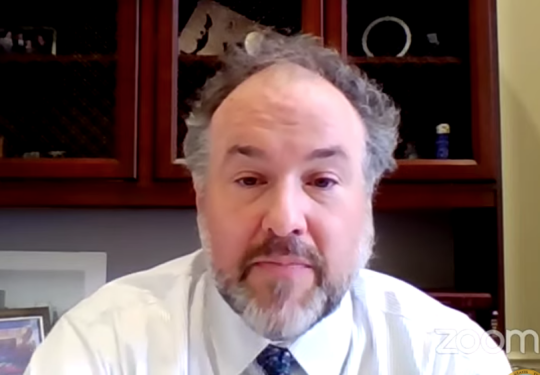 Del. Luke Clippinger (D-Baltimore City) testifies at a Senate Judicial Proceedings Committee hearing on Thursday afternoon (Screenshot)
Del. Luke Clippinger (D-Baltimore City) testifies at a Senate Judicial Proceedings Committee hearing on Thursday afternoon (Screenshot)ANNAPOLIS (March 25, 2021)—Del. Luke Clippinger (D-Baltimore City) emphasized his support for legislation that would in certain circumstances provide an alternative to criminal penalties for juveniles who are close in age and who send sexually explicit images of themselves via text.
It is a felony to possess or distribute sexually explicit images of minors. And doing so can land anyone, even teenagers sharing such images between themselves-on the sex offender registry or in jail.
The legislation, HB0180-Juveniles-Sexting, would establish a "certain mitigating factor in a certain juvenile court proceeding against a child for a certain violation if the violation involved or arose out of sexting" and would prohibit the court from "making a disposition of community detention if the violation arose out of sexting unless the court finds that extraordinary circumstances exist." It would also authorize the court "to order a child whose violation arose out of sexting to participate in an age-appropriate educational program on the risks and consequences of sexting."
"There is no question that in the legislature we treat issues related to the possession of child pornography as being very very important. And I know that we all agree that that is a very serious crime. But we also acknowledge that there are teenagers who are in healthy relationships for whom this is becoming a common practice. And I think that no one believes that teenagers should be put on the sex registry or detained for possession of images where there has been consent and where the two people are close in age," Clippinger said at a virtual Senate Judicial Proceedings Committee hearing.
Clippinger, who is chair of the House Judiciary Committee, explained how the legislation would work in layman's terms.
"It carves out the sending and receiving of most sexual images between young couples who are close in age from the statutes related to the possession and distribution of child pornography. It continues to give courts the discretion to address cases involving extraordinary circumstances while creating a separate alternative response for teenagers involved in sexting. And it does that by carefully defining sexting and requiring the court to consider whether the case involved sexting and then specifying what the court can do if the case does in fact involve sexting."
Harford County Deputy State's Attorney Gavin Patashnick expressed his support for Clippinger's bill, saying that law enforcement personnel have relayed to him that they believe that most of the teenagers who engage in sexting should not be put through the criminal justice system.
"The Department of Juvenile Services in the juvenile system is there to help. Law enforcement, in my interactions with them-do not want to put all kids in front of the Department of Juvenile Services for what they call: 'ordinary sexting.'"
Patashnick added: "Where they get concerned and where the state gets concerned is when the images are so out of control or crazy or there is too many of them that there is no choice but to forward them to the Department of Juvenile Services."
Baltimore County State's Attorney Scott Shellenberger emphasized that he supported the original version of the bill but not the amended version.
"The definition is good. We need that. That is great. The places where you say: 'Don't them to a juvenile facility. Don't basically incarcerate them.' That is great."
Shellenberger said his objection to the bill is based on language that would alter the definition of sexting.
"Sexting does not include conduct…if…the sender is more than four years older than the recipient. So a 17-year-old boy sends pornography to a 12-year-old girl and now that's not wrong? Isn't that the very thing that we are trying to fix? "
Members of the committee did not pose any questions to the witnesses during the hearing.


